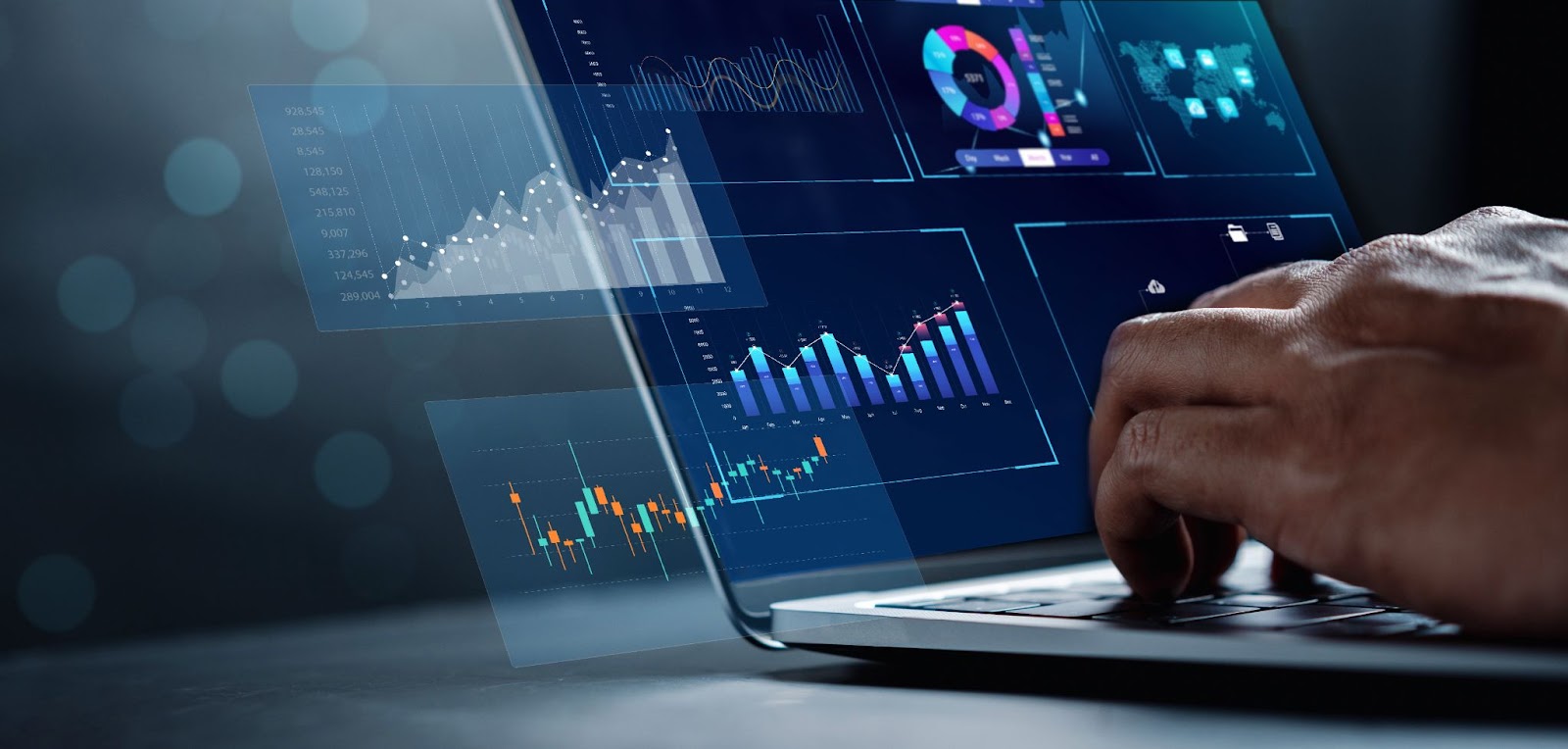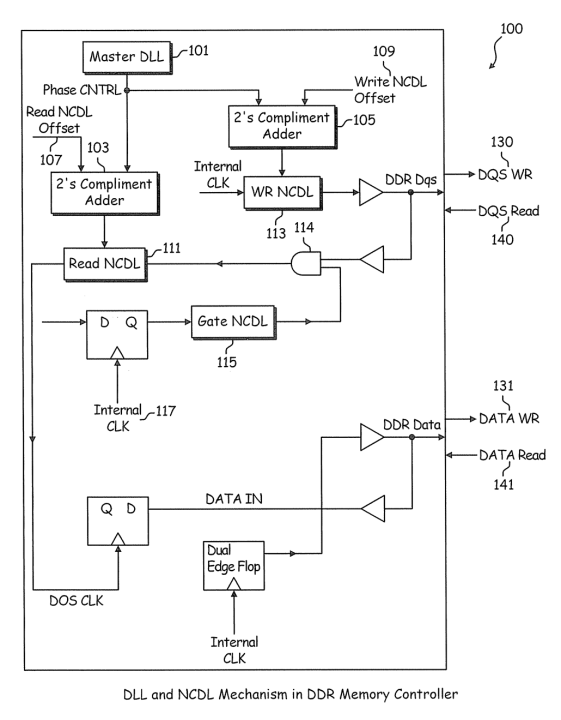The world of artificial intelligence (AI) has been evolving rapidly over the last few years. Many companies have found themselves in a race to utilize the potential of AI, seeking a competitive edge as they fight for influence in the market. In this blog, we dive into ktMINE’s data to analyze the IP portfolios of several organizations to shed light on their AI patents and groundbreaking products that are shaping the future of innovation.
Tech Giants with AI Patents
For many years, Google has worked to redefine the boundaries of technological innovation. At the forefront of AI research and development, Google’s commitment to shaping the future of technology is evident in its extensive collection of AI patents.
Google’s AI initiatives are reflected in products and services such as Google Search, Google Assistant, Google Photos, and the development of advanced neural networks such as BERT (Bidirectional Encoder Representations from Transformers) seen in Google’s AI-related patent below.
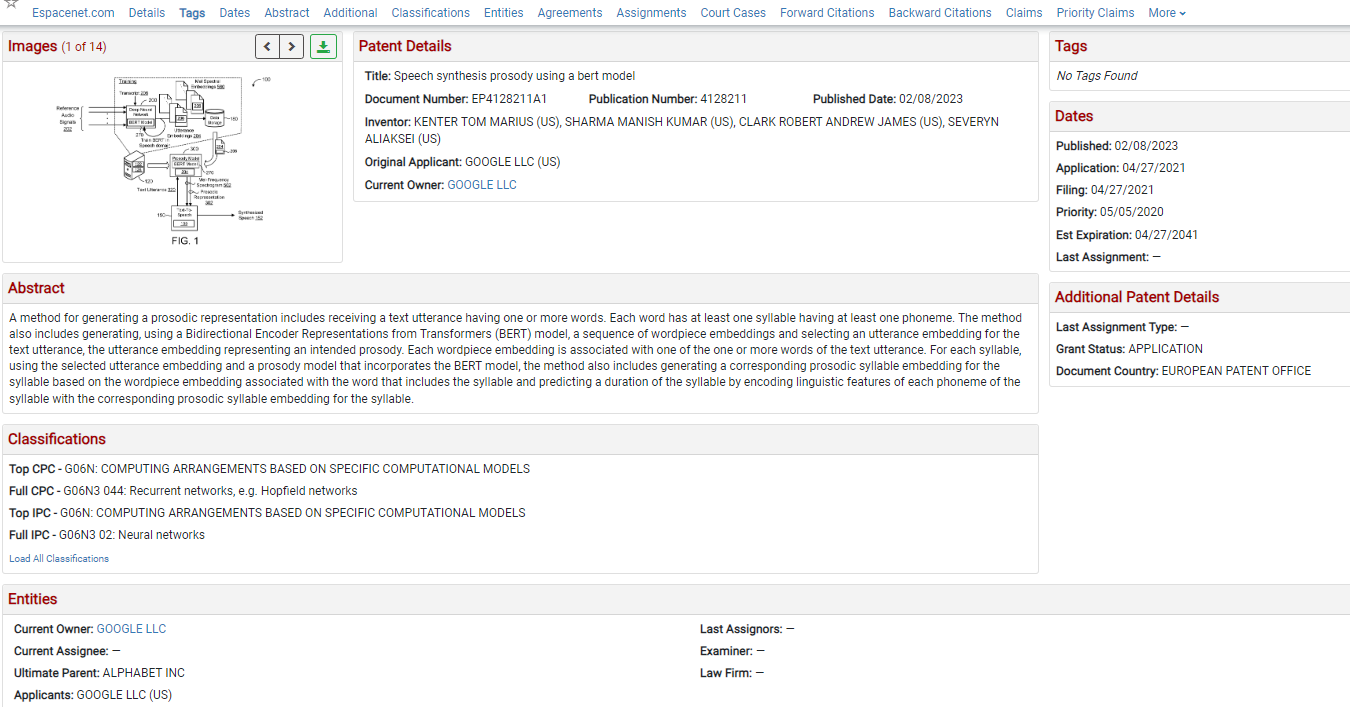
This tech giant has also focused its AI patent efforts on natural language processing, machine learning algorithms, computer vision, image and video analysis, as well as recommendation systems. In December of last year, Google combined these efforts and launched its own AI-driven tool – Gemini. This tool was built to be multi-modal, enabling an AI experience that seamlessly comprehends and operates with text, audio, images, videos, and advanced coding languages. Gemini is the first model to outperform humans with expertise in massive multitask language understanding.
Microsoft
With a reputation for relentless pursuit of innovation, Microsoft has embraced AI and solidified its impact through an impressive array of patents.
Microsoft has been a key contributor to the development of AI frameworks and platforms. Early last year, Microsoft announced its investment in OpenAI to help produce ChatGPT which kickstarted this revolution. Alone, Microsoft has launched other AI tools such as Azure Machine Learning and Cognitive Services, providing tools for developers to integrate AI capabilities into their applications.
Microsoft has been contributing to natural language processing technologies through language models, sentiment analysis, and automated conversational agents such as chatbots – as seen below in one of Microsoft’s AI-related patents.
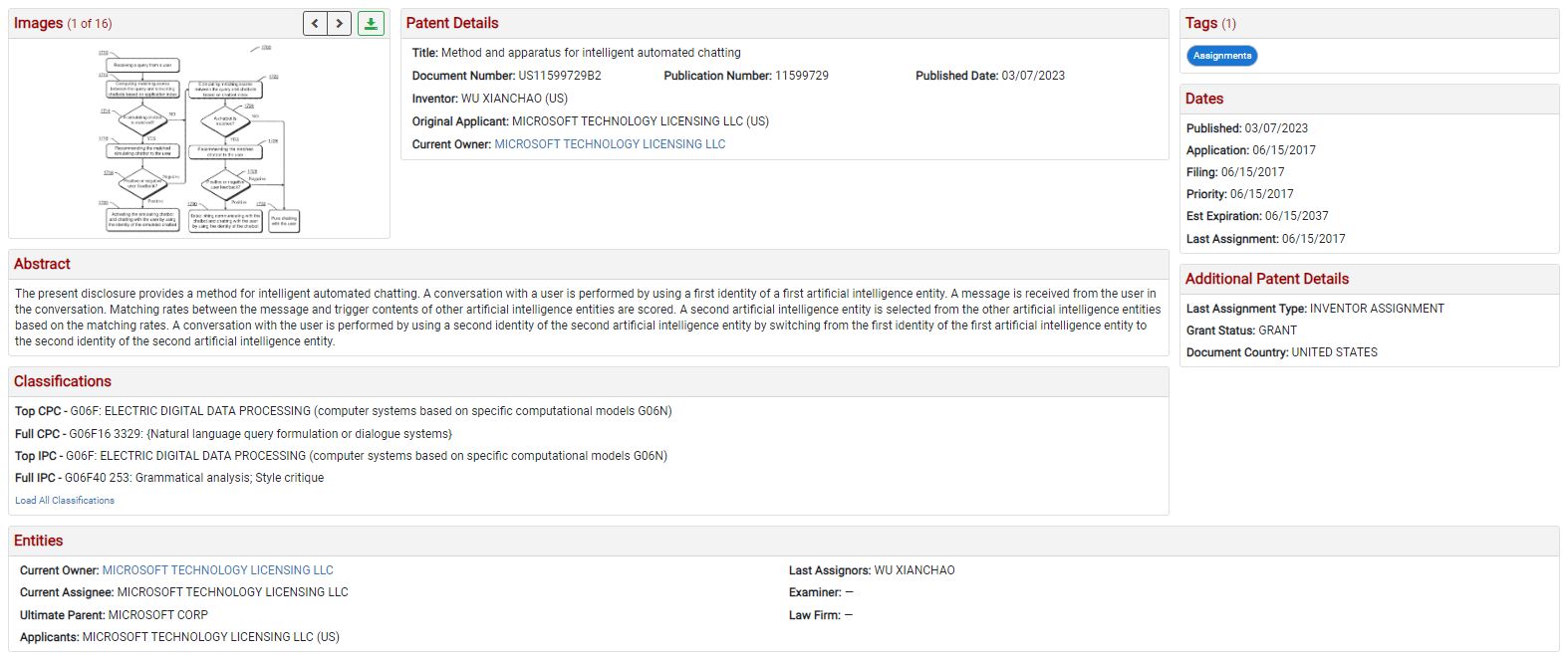
In November of 2023, Microsoft introduced Copilot, its own AI tool built on OpenAI’s GPT-4 model. Capable of assisting users in various tasks, Copilot excels in text and draft generation, creating formulas and equations, and even aiding in meeting organization and agenda creation.
Check out Microsoft’s first Super Bowl commercial in 4 years featuring its AI tool:
From patents relating to the development of AI-driven tools for enhancing productivity to active research collaborations and open-source AI projects, Microsoft’s commitment to progress and innovation within the AI space is undeniable.
IBM
This technology and consulting giant has a longstanding commitment to AI research. IBM’s extensive collection of AI patents mirrors its dedication to pushing the boundaries of what is achievable. IBM has been, and continues to be, a key player in cloud computing, AI, and quantum computing.
IBM’s commitment to applying AI in diverse industries is reflected in patents covering healthcare applications, financial services, and cybersecurity. Additionally, their AI patents are known for innovations in medical diagnostics, personalized medicine, fraud detection, and risk management.
IBM has developed AI-powered diagnostic tools that assist healthcare professionals with diagnoses by analyzing medical imaging data for anomalies and patterns using machine learning algorithms. In IBM’s patent below, you can see that it is working to personalize medicine with advanced analytics and machine learning techniques to identify genetic markers, predict treatment responses, and tailor therapies to match a patient’s individual needs.
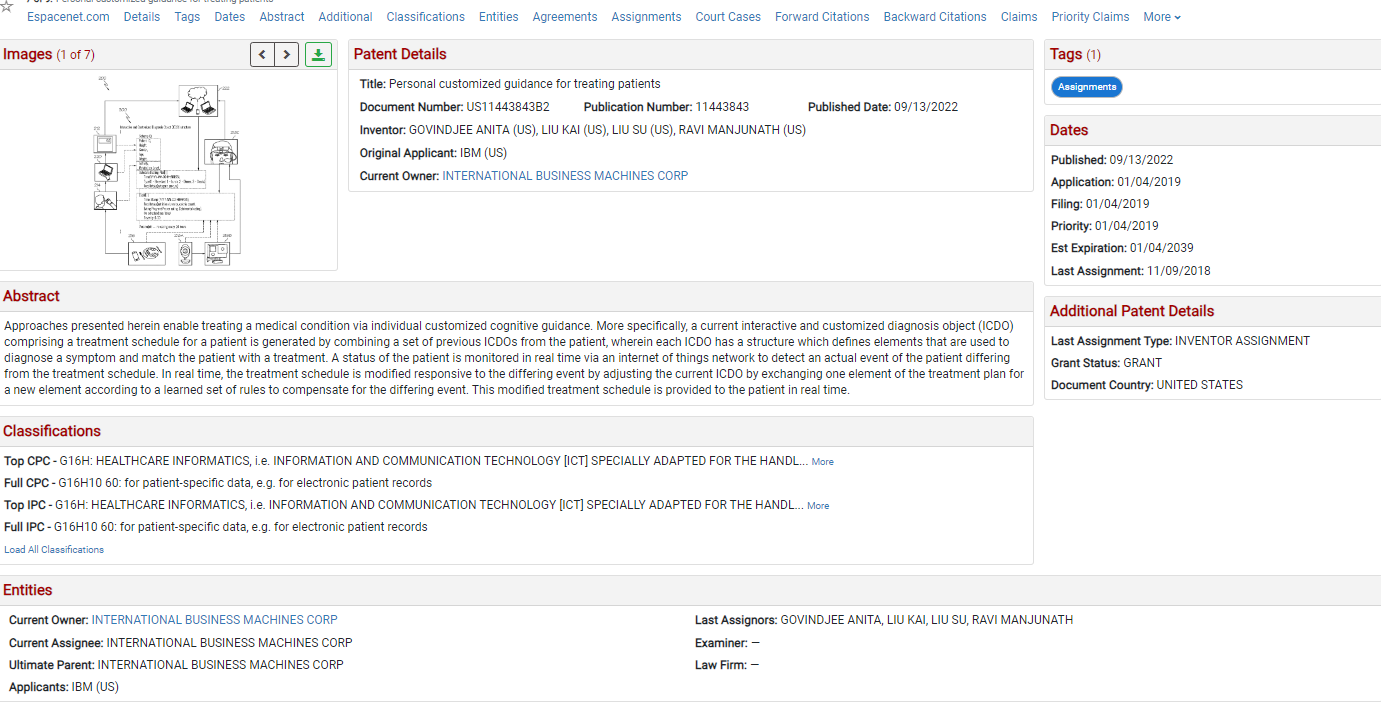
IBM also introduced its own AI tool, Watsonx.ai in May of 2023. WatsonX.ai is their AI-driven platform helping to reshape data analytics for businesses. With advanced tools like predictive analytics and natural language processing, it enables data-driven decision-making.
Amazon
We cannot discuss tech giants and their contributions to the AI market without touching on Amazon. Amazon has proved itself a key player in leveraging the transformative power of AI across diverse areas. From enhancing customer experiences to optimizing logistical operations, Amazon’s utilization of AI is both expansive and groundbreaking.
Over the years, Amazon has made remarkable progress in integrating AI into its products and services, boasting a substantial portfolio that covers a diverse array of AI-related patents. These technological advancements include voice-activated devices such as the Amazon Echo and Alexa, computer vision technologies for image and video analysis, machine learning algorithms specializing in personalized recommendations and predictive analytics, and innovations in logistics and supply chain management. Below is just one of the many AI-related patents owned by the tech giant.
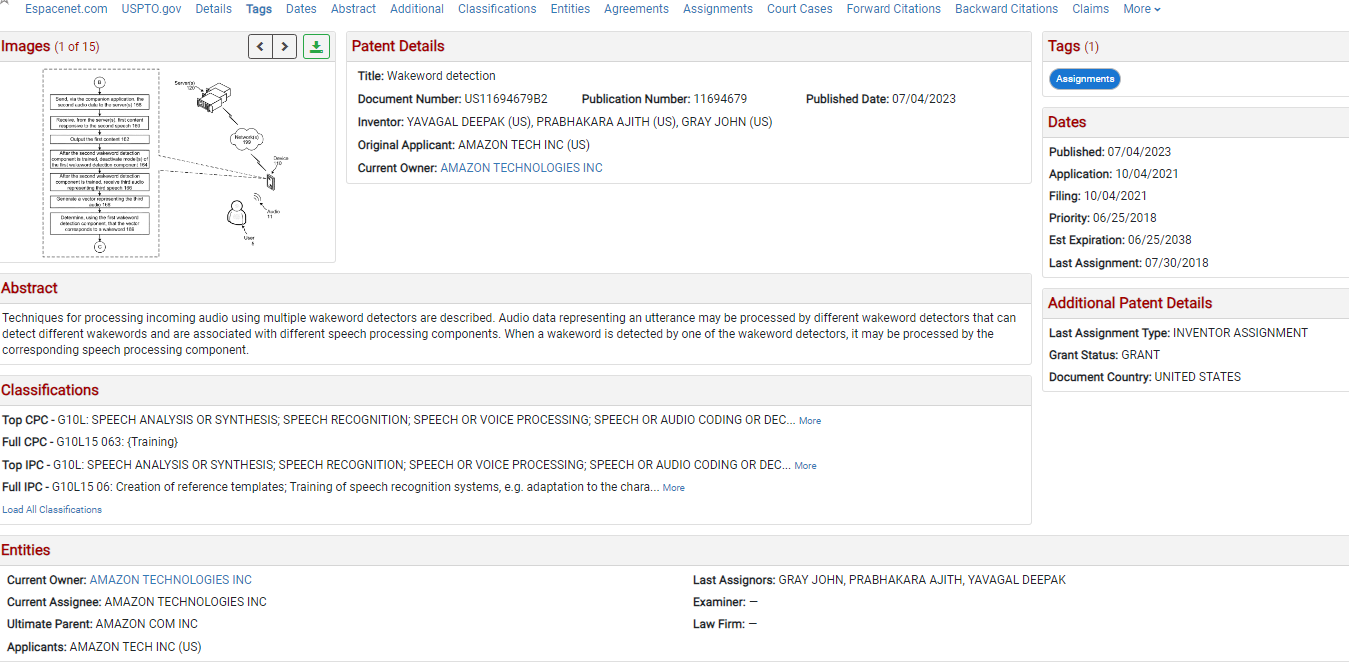
Amazon’s AI patents are frequently used in services such as Amazon Web Services (AWS), where machine learning and AI tools are provided as cloud-based services. The company also utilizes AI to optimize its e-commerce platform by enhancing customer experiences and exploring innovative solutions across diverse industries.
While these are just a few companies contributing to the artificial intelligence boom, their impact has left a lasting mark on the future of technological innovation.
AI Startups and Innovators
The well-known tech giants aren’t the only organizations leading the way in AI, there are several startups to watch in the coming years. Take a look at a couple of emerging companies known for their work in artificial intelligence.
OpenAI
At the forefront of AI innovation is OpenAI, an AI-focused company backed by Microsoft. Since the announcement of their partnership in January of 2023, OpenAI’s work has quickly pushed the boundaries of what is achievable in the technology sector. From cutting-edge language models to advancements in machine learning, OpenAI’s impact on the AI landscape is undeniable.
Based in the U.S., this artificial intelligence research institution prioritizes openness and sharing research findings globally. Unlike traditional approaches centered on patents, OpenAI opts for a different path. Instead, they release numerous influential models and technologies to the public, such as the renowned GPT (Generative Pre-trained Transformer) series. Notable for their capability to produce human-like text and execute diverse natural language processing tasks, these models have garnered significant attention.
NVIDIA
NVIDIA Corporation is another leading technology company known for its innovations in graphics processing units (GPUs) and AI computing. Originally known for its graphics cards and gaming hardware, NVIDIA is emerging as a key player in the AI and machine learning space.
NVIDIA’s highly optimized GPUs are excellent for parallel processing, making them well-suited for the training and inference tasks needed in deep learning models. NVIDIA’s CUDA platform and libraries also enable developers to accelerate AI applications and research across various industries, including healthcare, finance, and autonomous vehicles.
For instance, in the patent below, NVIDIA’s platforms for autonomous driving leverage AI and computer vision technologies, facilitating the development of advanced driver assistance systems (ADAS) and autonomous vehicles.
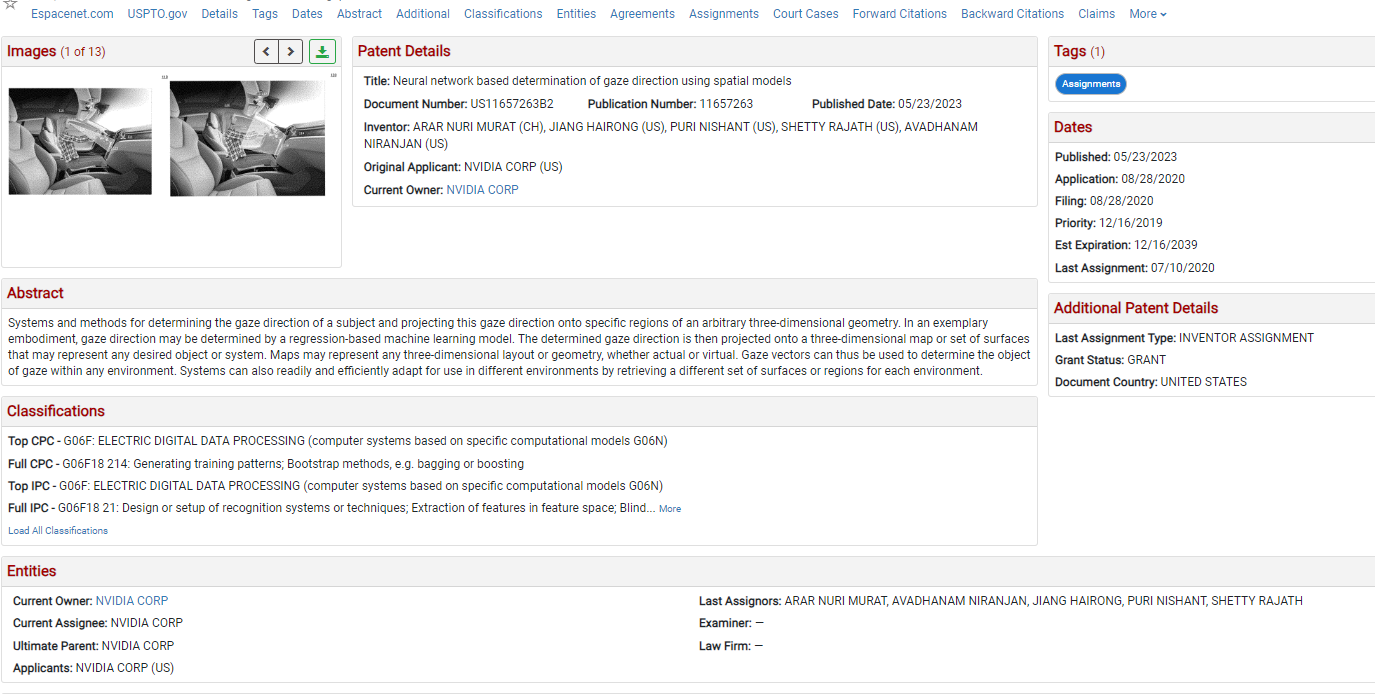
NVIDIA’s contributions to graphics technology, AI computing, and high-performance computing have positioned the company as a driving force behind advancements in artificial intelligence, shaping the future of computing and artificial intelligence in the coming years.
Industries and AI Patents
The AI market extends far beyond powerhouse companies and spreads across diverse industries, revolutionizing traditional processes and enhancing efficiency across the board.
The integration of AI in healthcare research and treatment has opened up a world of possibilities by implementing technology with medical practices. AI facilitates advanced diagnostic tools, enhances accuracy, and tailors personalized treatment plans through machine learning algorithms. This AI boom has led to improved patient care, optimized workflows, accelerated drug discovery, and streamlined administrative tasks like billing and coding. As AI technology advances, its integral role in shaping the future of healthcare becomes increasingly evident.
The new technology shown below has been developed to aid in the discovery process for new drugs through the use of AI coding. In this case, artificial intelligence is used to optimize the drug discovery process by helping to quickly identify potential drug compound sequences and reactions.
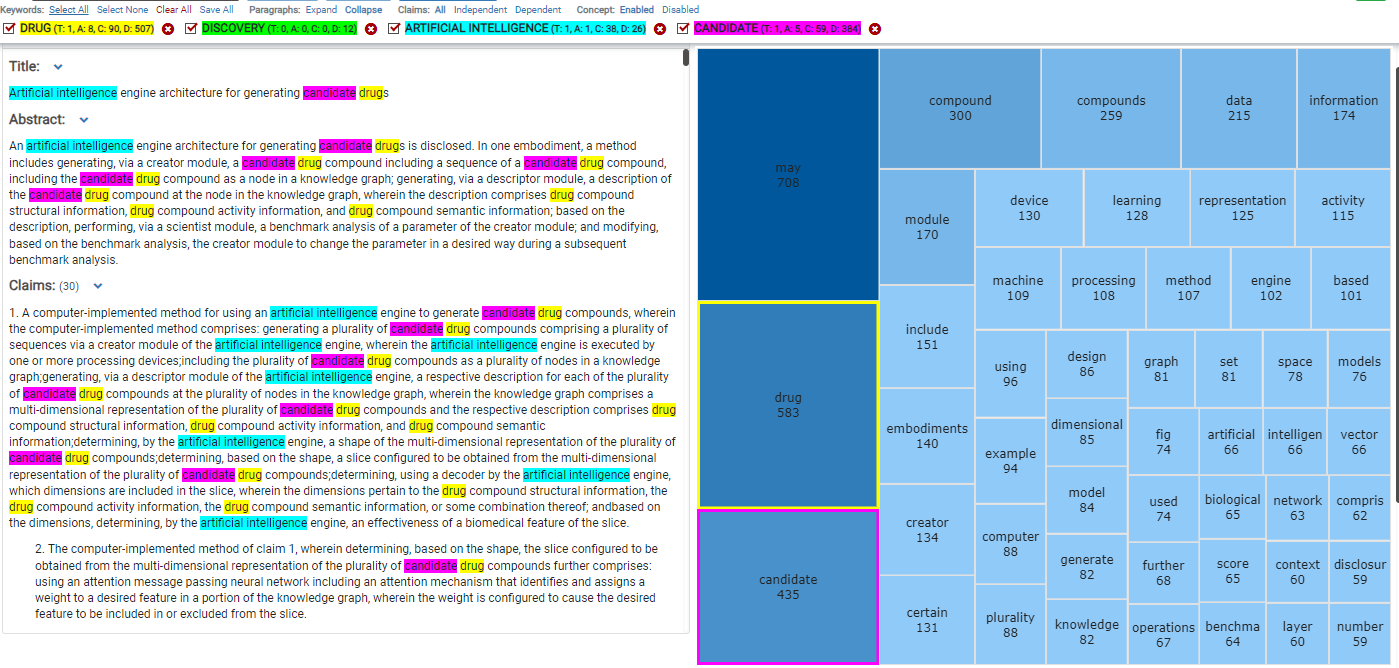
Try it for yourself: Using ktMINE’s Search Application, you can run keyword searches through patent text to quickly identify items in your search!
In the finance sector, AI-patented technology is optimizing traditional practices. AI has transformed risk management, fraud detection, investment strategies, and trading processes. Machine learning algorithms enable real-time pattern recognition, speed up investment analyses, detect fraud, ensure regulatory compliance, assess creditworthiness, and optimize asset allocation. Additionally, virtual assistants and chatbots streamline operations and enhance customer satisfaction, positioning financial institutions for success in a dynamic market landscape.
An example of AI’s impact on the finance industry can be seen in the patent profile displayed below. This patent is one of many new technologies that are being used to combat security risks and identify fraudulent behavior. This is done through real-time analysis and account behavior profiling to provide financial institutions with a fraud scoring system that assesses the risk of fraudulent activity.
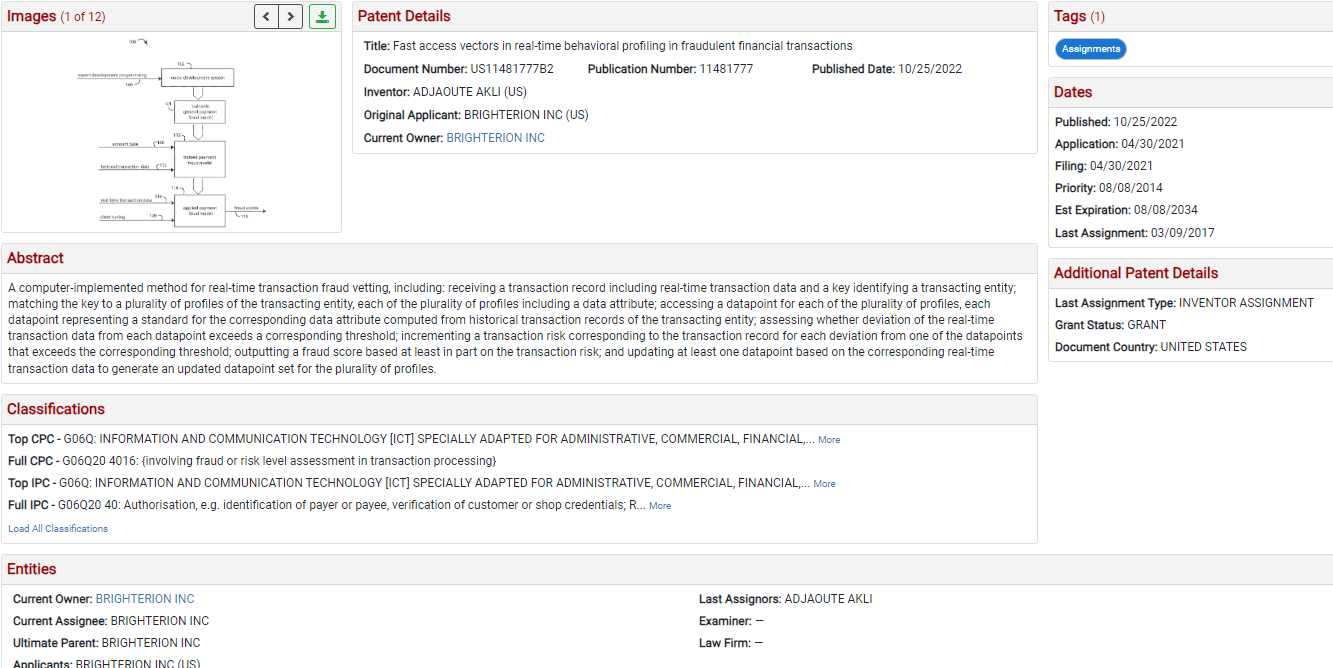
AI is also revolutionizing the automotive industry by enhancing safety, efficiency, and convenience. AI-powered autonomous driving systems analyze sensor data, detect obstacles, interpret road signs, and anticipate traffic patterns to enable vehicles to operate safely without human intervention. AI also enhances ADAS systems like adaptive cruise control and lane-keeping assistance. From traffic management systems to predictive maintenance aids, AI is driving the development of safer, more efficient vehicles; shaping the future of technology and transportation.
Using ktMINE’s Search application, you can see a visual representation of the AI boom in the automotive industry over the past few years. This data can also be used to analyze and identify the top AI patent holders by location, classification type, and more.
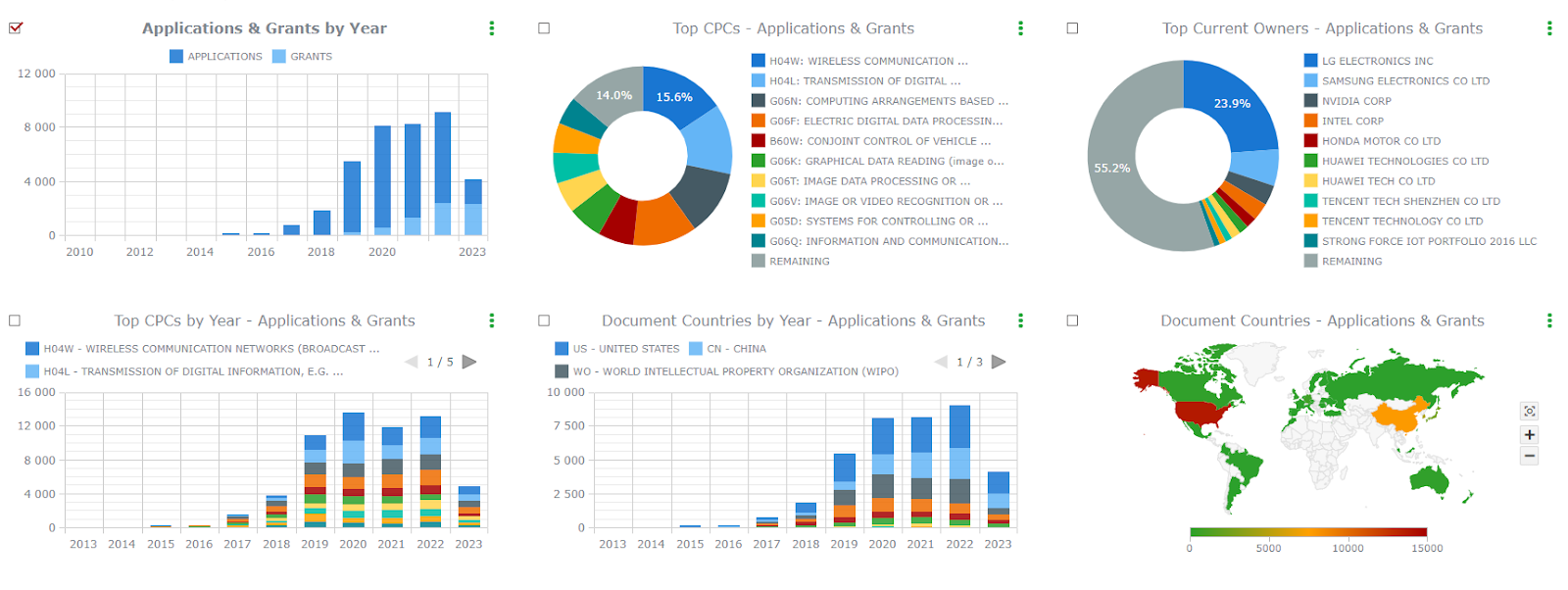
Pro Tip: The Analytics page of the Search App can be used in your research to view customizable, interactive graphs relating to your search
AI-powered platforms are revolutionizing legal research, document review, and contract analysis, enabling lawyers to navigate complex legal issues with unparalleled speed and accuracy.
For example, the patented technology shown below uses the power of artificial intelligence to aid in contract review, analysis, classification, and storage.
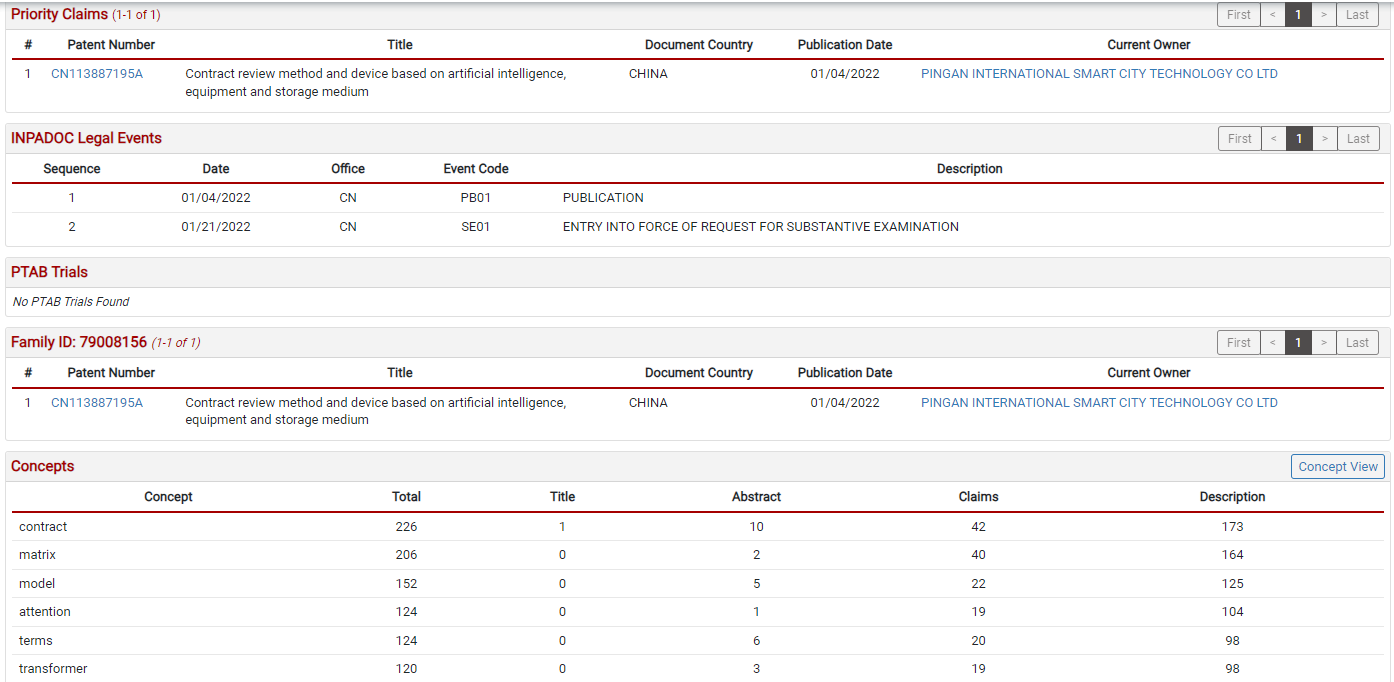
By harnessing the power of AI, legal practitioners can conduct comprehensive research, predict case outcomes, and manage compliance requirements more effectively than ever before. From streamlining due diligence processes in mergers and acquisitions to providing actionable insights through legal analytics, AI data solutions are reshaping how law firms operate while empowering them to deliver exceptional value to clients.
Intellectual Property and Legal Considerations
As companies race for a competitive edge, the ins and outs of licensing agreements become essential, setting the stage for collaborations or, occasionally, sparking debates.
One key aspect of IP rights in AI patents is patentability. In many jurisdictions, inventions related to AI technologies may be eligible for patent protection if they meet specific criteria, such as novelty, non-obviousness, and utility. Intellectual property rights also govern the licensing and commercialization of AI patents. Patent holders have the exclusive right to license their patents to third parties, enabling them to generate revenue through royalties, licensing fees, and strategic partnerships. Licensing agreements for AI patents often involve complex negotiations and considerations related to exclusivity, territorial rights, sublicensing, and royalty rates.
Licensing agreements enable patent holders to share their innovations with the world while still protecting their interests. Additionally, patenting AI-related technology provides patent owners with the ability to pursue legal action if disputes arise relating to their patented technology. Patent litigation cases such as Mirror Imaging LLC V. Viewpointe Archive Services LLC et al displayed below showcase the critical role patent litigation plays in protecting intellectual property rights.
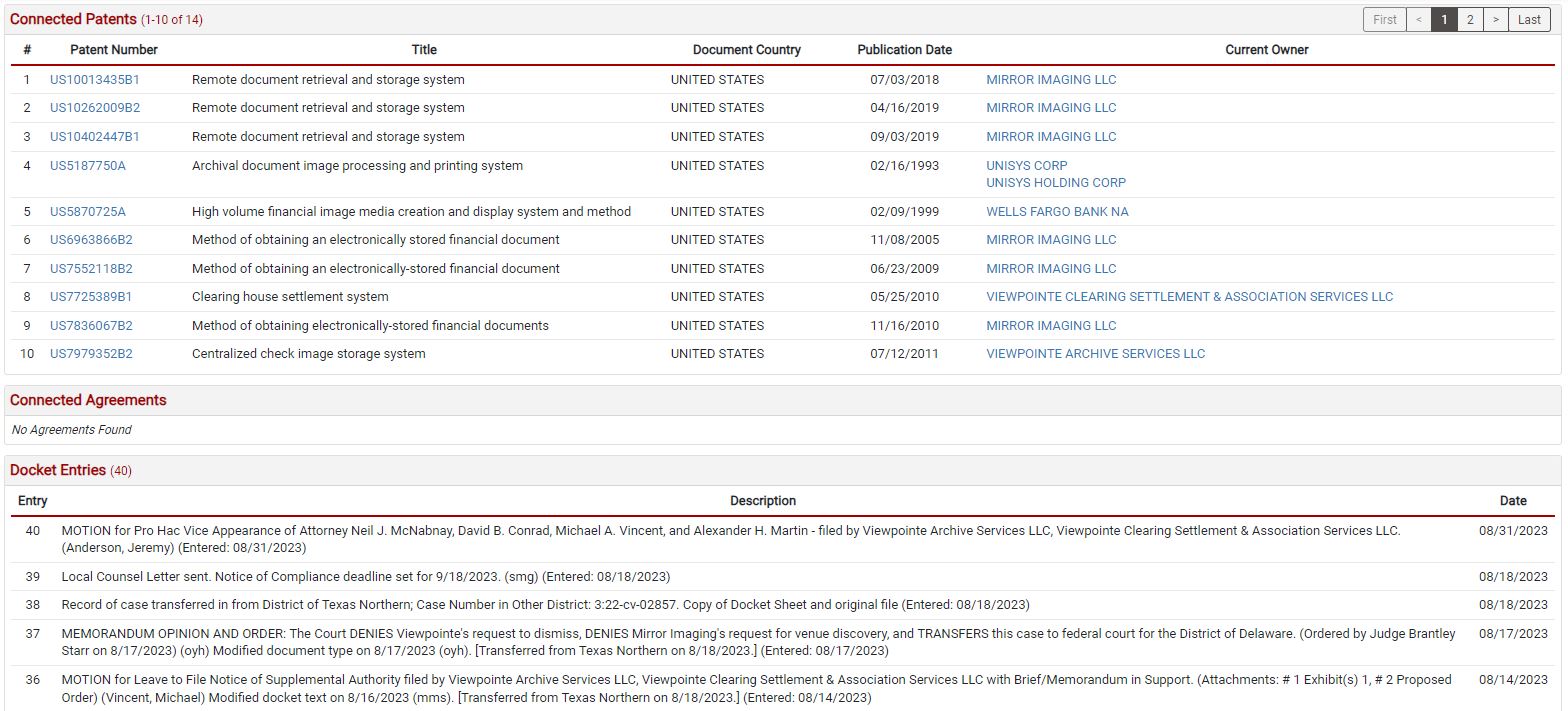
AI patents are crucial for companies, driving technological advancements, fostering innovation, and enhancing competitiveness. They safeguard intellectual property and push the boundaries of AI capabilities, positioning patent holders as leaders in shaping the future. With a competitive edge, companies explore new territories, driving the AI revolution and shaping innovation for the future. Exciting to track their progress in the AI market!

